In this article:
Essential oils are concentrated “essences” obtained from plants that contain beneficial compounds and aroma. They are used widely in aromatherapy and alternative medicine as a way to promote healing and relaxation. (1)
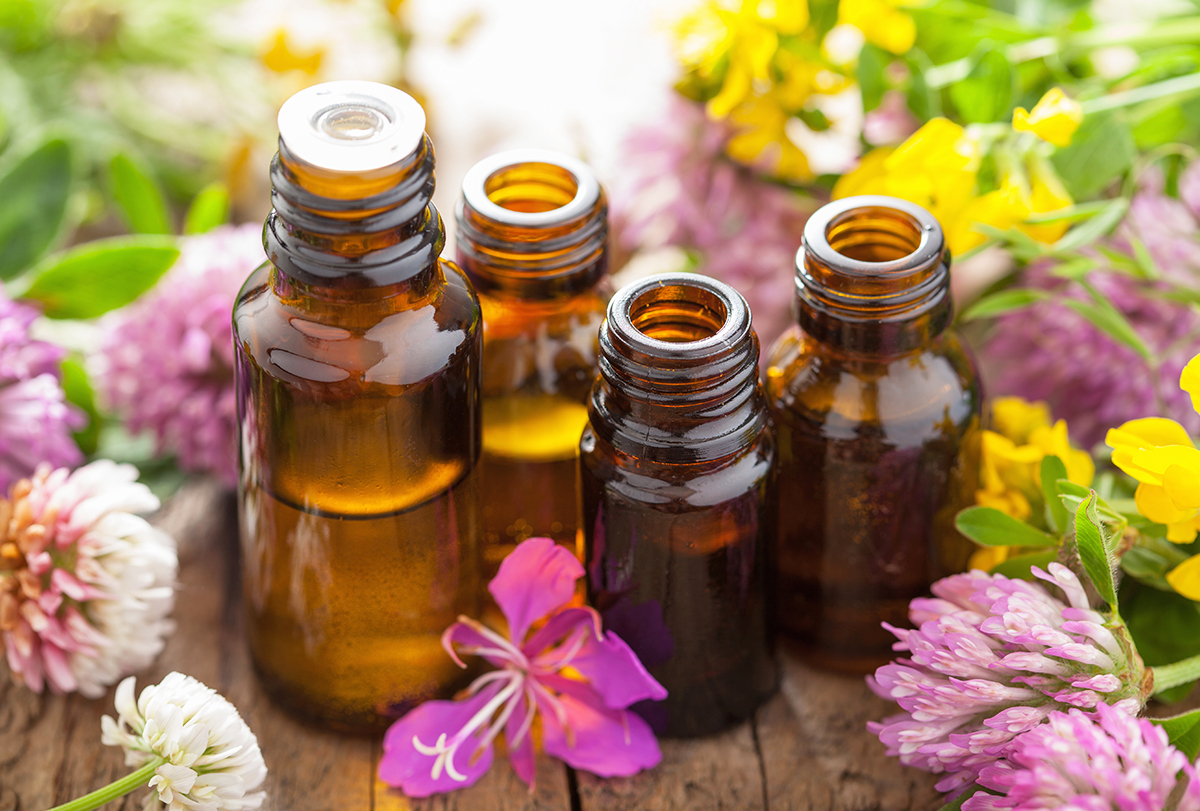
While they have been around for quite some time, essential oils have become particularly popular only recently.
Health Benefits of Essential Oils
Essential oils help reduce stress and anxiety, may promote healing, and can help you sleep better.
Here are some of the most popular essential oils and their uses:
1. Lavender oil (Lavandula angustifolia, aka Lavandula officinalis)
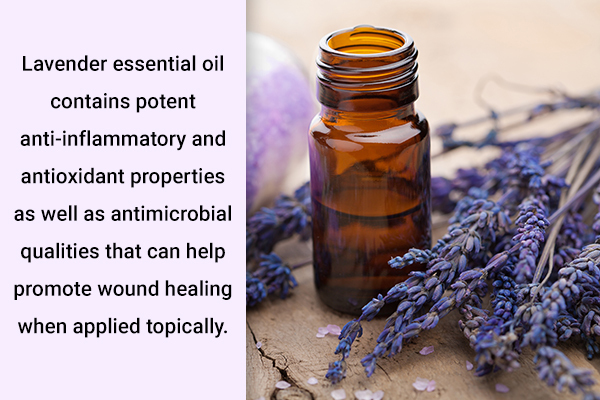
Lavender essential oil is a well-known aromatherapy treatment. It contains potent anti-inflammatory and antioxidant properties as well as antimicrobial qualities that can help promote wound healing when applied topically.
Lavender essential oil is useful in treating a number of skin conditions. It is a natural remedy for skin infections and irritation. (2)
Some of the common uses of lavender are:
- Reduces stress and promotes relaxation in aromatherapy
- Fights microbial infections, heal cuts and scrapes, etc., when applied topically
- Provides quick relief from headaches when used in a head or temple massage
- Relieves cough and other respiratory infections when used in steam inhalation (3)
2. Tea tree oil (Melaleuca alternifolia)
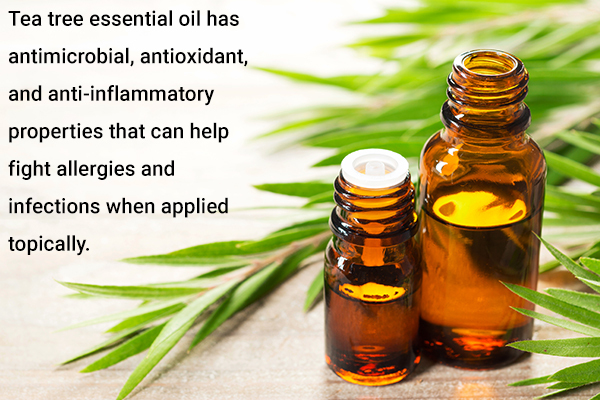
Tea tree oil is a common skin care ingredient that can boost the overall look and health of your skin. It is also great for your scalp as it helps fight dandruff.
Tea tree oil has potent antimicrobial, anti-inflammatory, and antioxidant properties that can help fight allergies and infections when applied topically.
Some of the benefits of applying tea tree oil include:
- Helps fight fungal, viral, and bacterial skin infections such as athlete’s foot, cold sores, and warts
- Helps in the treatment of acne
- Provides relief from inflammatory skin conditions such as dermatitis and eczema (4)
- Fights dandruff and other scalp infections
- Promotes wound healing
- Provides relief from insect bites
3. Peppermint oil (Mentha piperita)
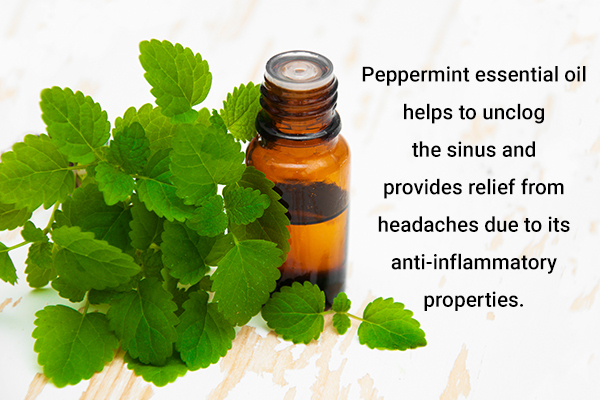
Peppermint oil is one of the most useful essential oils. Many studies have shown the efficacy of peppermint oil in the following:
- Provides relief from irritable bowel syndrome (IBS) when consumed in the form of capsules
- Fights respiratory allergies when inhaled via steam
- Unclogs the sinus and provides relief from headaches due to its anti-inflammatory properties (5)
4. Lemon oil (Citrus limonum)
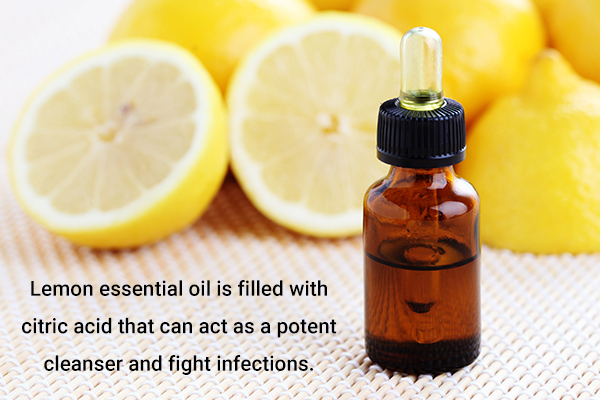
Lemon oil has all the beneficial properties of other essential oils with an added benefit: it smells wonderful to most people. (6) It is filled with citric acid that can act as a potent cleanser and fight infections.
Lemon oil has the following benefits:
- Provides relief from the symptoms of a cold
- Widely used in aromatherapy due to its soothing smell
- Fights bacterial and fungal infections
- Relieves nausea in some people (7)
5. Eucalyptus essential oil (Eucalyptus globulus)
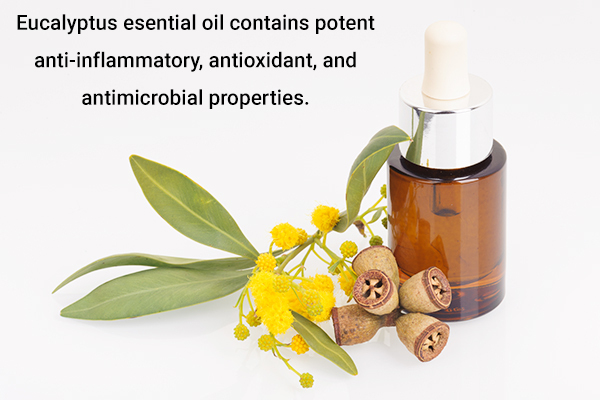
Eucalyptus oil contains potent anti-inflammatory, antioxidant, and antimicrobial properties that can be useful in the following ways:
6. Clove oil (Syzygium aromaticum)
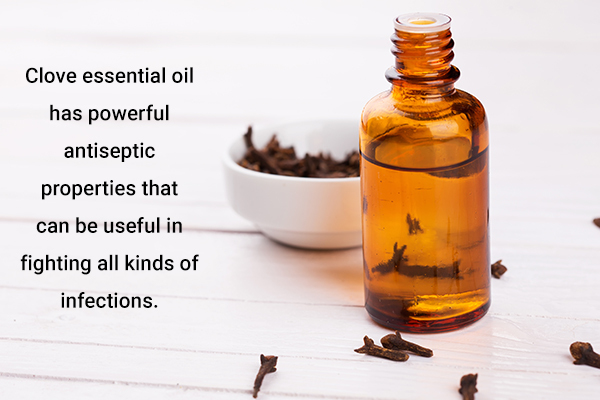
Clove oil has traditionally been used in many cultures around the world as a medicinal oil.
It has powerful antiseptic properties that can be useful in fighting all kinds of infections. It also has anti-inflammatory properties that promote wound healing and relieve pain.
These are the common uses of clove oil:
7. Neroli oil (Citrus aurantium var. amara)
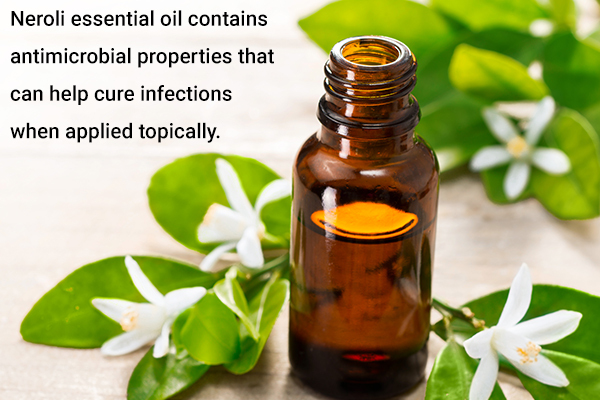
Neroli oil, or bitter orange oil, has a soothing citrus aroma and has long been used in aromatherapy as a stress and anxiety reliever. (12)
Neroli contains antimicrobial properties that can help cure infections when applied topically.
The common benefits of neroli oil are:
- Promotes relaxation.
- Acts as an antidepressant and can be used as a temporary solution for postpartum depression (13)
8. Ylang ylang oil (Cananga odorata)
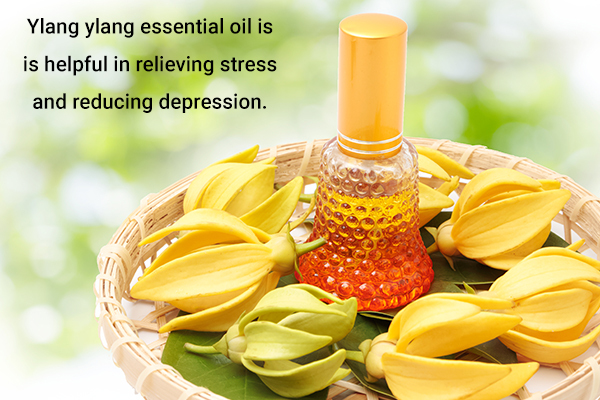
Ylang ylang oil comes from a tree native to Southeast Asia (e.g., Indonesia, Malaysia, and the Philippines). The oil is extracted from the flowers of the Cananga odorata tree and has recently gained attention across the world as a potent medicinal oil.
Several studies have demonstrated the beneficial effects of ylang ylang oil in promoting stress relief and fighting depression. (14)
The benefits of ylang ylang oil for the body include:
- Acts as a potent aphrodisiac
- Beneficial for the nervous system: helps fight depression and anxiety and reduces the stress hormone cortisol (15)
9. Frankincense oil
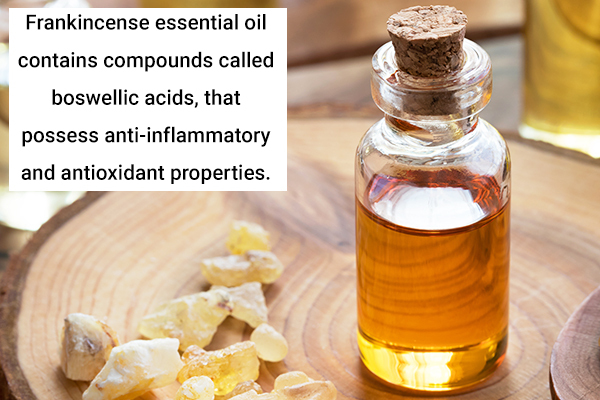
Frankincense oil is another popular essential oil used in many parts of the world and has been used as a traditional form of aromatherapy in Asian cultures.
Extracted from the Boswellia tree, frankincense oil contains compounds called boswellic acids, which possess anti-inflammatory and antioxidant properties.
Frankincense oil offers the following benefits:
- Promotes relaxation and fights stress
- Contains antiseptic properties
- Provides moisturization when applied topically (16)
10. Rosemary oil
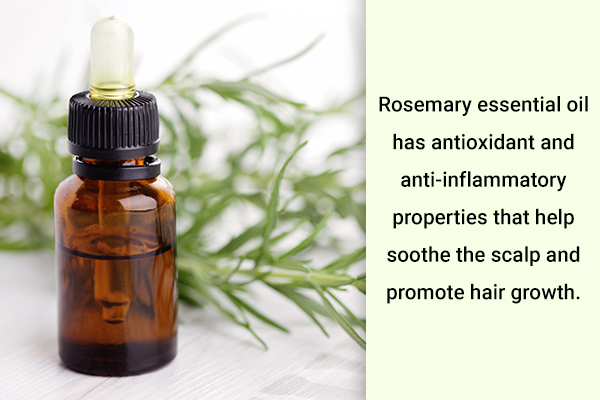
Rosemary oil is a well-known spice used to season food. However, it also has many antioxidants and anti-inflammatory compounds.
Some of the medicinal properties of rosemary oil are:
- Improves blood circulation
- Provides relief from muscle aches when applied topically
- Soothes the scalp and promotes hair growth
- Treats indigestion
- Provides mild antimicrobial effects
How to Use Essential Oils
Essential oils can be used in a variety of ways. They can be used in aromatherapy or applied topically to the skin.
Certain essential oils are also safe to consume and can be taken in the form of capsules.
Safety Tips When Using Essential Oils
Keep these things in mind when using essential oils:
- Dilute them: When applied topically, essential oils should be used with caution and is better diluted with a milder oil such as sunflower oil or coconut oil.
- Test your skin: Always perform a patch test before applying any essential oil to your skin.
- Never ingest them: Do not consume any essential oil that is not specifically made for ingestion. It can cause harmful side effects such as indigestion, severe diarrhea, and even heart problems.
- Store them properly and safely: Essential oils are completely natural but can be very powerful. Keep them out of reach of small children.
- Be mindful if pregnant: Rosemary oil, thyme oil, camphor oil, and other essential oils are potent and should be avoided during pregnancy. Do not use essential oils during pregnancy without consulting your doctor first.
Side Effects of Essential Oils
Essential oils can lead to the following side effects:
- Some oils can cause skin irritation and inflammation when applied topically.
- Some oils may cause an upset stomach when consumed orally.
Most-Asked Questions About Essential Oils
How to find quality essential oils?
Essential oils are not regulated by the FDA. Hence, it is essential to check the source of your oils and make sure they are authentic.
Always read the label and composition of the bottle carefully. Buy bottles that have clearly defined scientific names of the plant and concentration of the essential oil, no or very less preservatives or fragrances added, etc., are the most authentic.
What is the common method of application of essential oils?
Essential oils can be inhaled via steam, sprayed, applied topically, or, in some cases, consumed.
It is important to note that different oils have to be used in different ways. Always check the label carefully to know how the oil you bought can be used. Never consume any oil that is not specifically made for ingestion.
Final Word
Essential oils are potent extracts of plants that offer various benefits.
They are widely used in aromatherapy to reduce stress and anxiety. They are also useful in treating common skin conditions due to their anti-inflammatory and antioxidant properties. However, they can be as potent as allopathic drugs and should be used carefully.
Perform a patch test before applying any essential oil topically and do not consume any without a doctor’s approval.
- Was this article helpful?
- YES, THANKS!NOT REALLY


